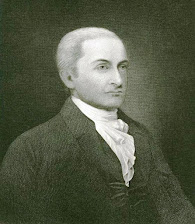[We have the following announcement. DRE]
 |
| John Jay (NYPL) |
The conference events are free and open to the public. To attend the events, attendees will need to register beforehand. For registration information and the full conference program visit In Service to the New Nation: The Life & Legacy of John Jay
Joanne Freeman, Class of 1954 Professor of American History and American Studies at Yale University, will deliver the keynote address "Life in an Age of Conflicts and Extremes." The keynote address will be held via Zoom Webinar on Friday, January 22, 6:00-7:30 PM EST.
There will then be four panel sessions to be held via Zoom Webinar on Saturday, January 23, 10:30 am-5:30 PM EST.
Panel 1: Diplomacy and Politics (10:40 am – 12:00 pm)
Chair, Mary A. Y. Gallagher (John Jay Papers)
Kings College and the Foundations of John Jay’s Diplomacy
Benjamin C. Lyons (Columbia University)
John Jay’s 1788 “Address to the People of the State of New York” and the Dynamics of the Ratification Debate: A New Look
Todd Estes (Oakland University)
Two Treaties, Two Diplomats, and Two Scholarly Editions: John Jay, Thomas Pinckney, and the Art and Practice of Scholarly Editorial Collaboration
Constance B. Schulz (Pinckney Papers, University of South Carolina)
Panel 2: Family, Slavery, and Abolition (1:00 – 2:20 pm)
Chair, Elizabeth M. Nuxoll, (John Jay Papers)
Mastering Paradox: John Jay, Slavery, and Nation Building
David N. Gellman (DePauw University)
John Jay and the Intimate Politics of Slavery and Antislavery
Sarah Gronningsater (University of Pennsylvania)
“One of them married Colonel Stuyvesandt, another of them married my grandfather”: John Jay, Genealogy, and the Shape of a New Nation
Karin Wulf (Omohundro Institute of Early American History and Culture, College of William & Mary)
Panel 3: Navigating Networks and Publics (2:30 – 4:05 pm)
Chair, Herbert Sloan (Barnard College)
John Jay and the Press
Sara Georgini (Adams Papers, Massachusetts Historical Society)
Investing in Social Networking in Sarah Livingston Jay’s New York
Alisa Wade (California State University, Chico)
John Jay in Voluntary America
Jonathan Den Hartog (Samford University)
Did the Man Make the Robe? John Jay Dressed for the Court
Claire Jerry (Smithsonian National Museum of American History)
Bethanee Bemis (Smithsonian National Museum of American History)
Panel 4: Roundtable on The Future of Documentary Editing & the Founding Era (4:15 – 5:20 pm)
Chair, R. Darrell Meadows (National Historical Publications and Records Commission)
Sara Martin (Adams Papers, Massachusetts Historical Society)
Holly C. Shulman (Dolley Madison Digital Edition)
Jennifer E. Steenshorne (John Jay Papers)
Jennifer Stertzer (Washington Papers, Center for Digital Editing)

